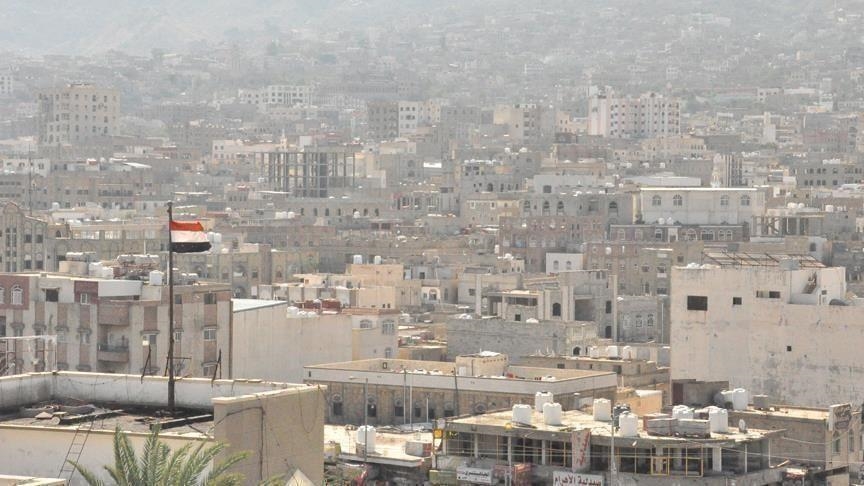‘UN’s disarmament agenda for Yemen falls short’
Issuing international resolutions ‘not enough’ to resolve armed conflicts, diplomat says

ISTANBUL
The UN’s approach to resolving the long-running conflict in Yemen is insufficient as disarmament and arms control requires a gradual approach and detailed plans, a Yemeni diplomat said as the UN marked Disarmament Week.
Speaking to Anadolu Agency, Askar Zoail, the military attaché at the Embassy of Yemen in Turkey, said armed groups have turned Yemen into “complete chaos” by which the country has lost its security and stability.
“The lack of disarmament affected the peace process in Yemen, as it contributed to the prolongation of the war, the emergence of warlords, the increase of terrorist activities and the division of the country and created an unprecedented humanitarian disaster,” Zoail said.
Zoail believes that the collapse of the state after the “Houthi coup” on Sept. 21, 2014, with the help of former President Ali Abdullah Saleh opened the door wide for the Iranian-backed Houthi rebels to control the state’s weapons.
“The inclusive chaos in the country provided an opportunity for al-Qaeda and the military forces of the Southern Transitional Council [STC] to acquire more weapons,” he noted.
Zoail accused regional powers of worsening the situation in Yemen as the United Arab Emirates provided the STC forces with heavy weaponry and Iran is “still smuggling weapons” into Yemen to the Houthis that were not present in the country before, including drones and missiles.
UN resolutions
While UN Security Council Resolution 2216 (2015) demands the Houthis to end the use of violence and relinquish all additional arms seized from military and security institutions, including missile systems, Zoail thinks that having an international resolution is “not enough” to dismantle armed groups in Yemen as they are using violence as a tool to achieve certain objectives.
“Disarmament terrifies these groups as it requires them to turn over their heavy weaponry, which is vital to their role as local agents of Iran and the UAE,” he said.
Referring to the foreign influence in Yemen, Zoail noted that Iran is using the Houthis as a “valuable card to maneuver in its game with regional and international powers.”
“The UAE is also using the STC to strengthen its influence by controlling the coasts of Yemen which contributes to the survival of its economy and adds additional value to its strategic agenda of being a strong regional player helping its international allies who control the UN resolutions,” he added.
The Security Council also adopted resolution 2511 (2020), expressing concern over the ongoing political, security, economic and humanitarian challenges in Yemen — including the ongoing violence and enforced disappearances — and threats arising from the illicit transfer, destabilizing accumulation, and misuse of weapons.
Resolution 2216 also demands the Houthis to refrain from any provocation or threats to neighboring states, including through acquiring surface to surface missiles and the stockpiling of weapons in any bordering territory of a neighboring state.
“UN resolutions, in most cases, have not resolved any conflict in the world. The situation in Palestine is the best evidence for this,” Zoail said.
Riyadh Agreement
Under the auspices of Saudi Arabia, the legitimate government of Yemen signed a deal with the STC on Nov. 5, 2019 in the Saudi capital Riyadh which calls for the formation of a shared government, the unification of the country’s armed forces, and the return of the internationally recognized government (IRG) to Aden.
While the STC has become part of the current government, it is still “refusing” to implement the military part of the agreement as it “fears losing its control over many state institutions in the south,” Zoail said.
“The STC believes that implementing the agreement takes away its power and turns over its weapons to the legitimate government. Thus, it will not be able to implement its ambitions to become the only ruler in the southern region and accomplish its separatist agenda,” he added.
The STC forces will be incorporated into the ministries of interior and defense, which will ultimately be under the authority of President Abdrabbuh Mansur Hadi’s government, according to the Riyadh Agreement.
Although the STC and the IRG have repeatedly reaffirmed their commitment to the agreement, it is evident that neither of the parties are genuinely interested in following through with the deal.
Zoail underlined that keeping weapons in the hands of these groups (Houthis, STC and al-Qaeda) creates a “threat to national security and undermines international peace and security.”
“Maintenance of the security chaos in Yemen is endangering regional security, exposing the international maritime commercial routes to more terrorist attacks and increasing the flow of weapons to terrorist groups,” he added.
UN Disarmament Week is observed annually from Oct. 24-30 to promote awareness and understanding of the issue of disarmament to reduce the use of weapons and bring peace to societies.
The observance of disarmament week was first suggested in the Final Document of the UN General Assembly’s special session on disarmament in 1978.
The United Nations Disarmament Commission (UNDC) was set up in 1952 under the UN Security Council with a mandate to prepare proposals for a treaty for the regulation, limitation and balanced reduction of all armed forces including the elimination of all weapons of mass destruction.
Anadolu Agency website contains only a portion of the news stories offered to subscribers in the AA News Broadcasting System (HAS), and in summarized form. Please contact us for subscription options.







